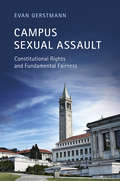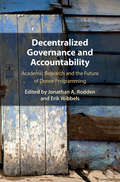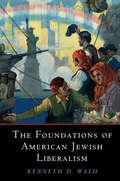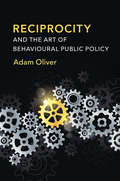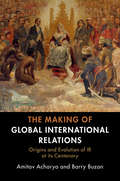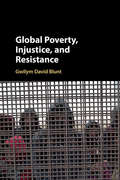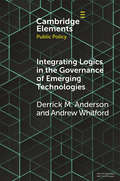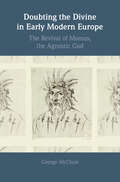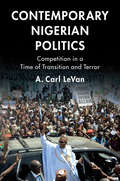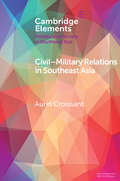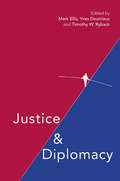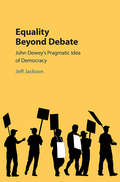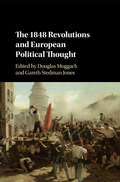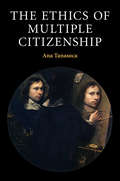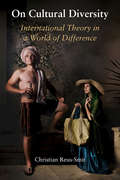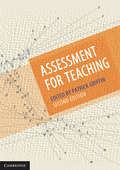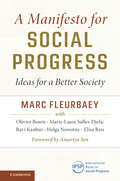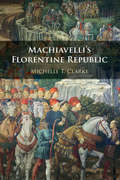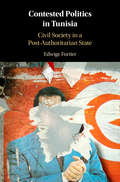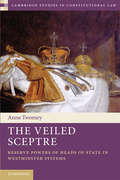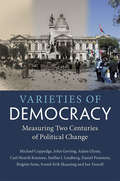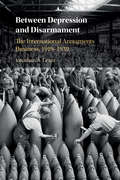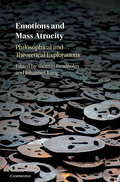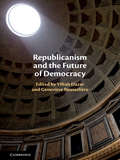- Table View
- List View
Campus Sexual Assault: Constitutional Rights and Fundamental Fairness
by Evan GerstmannSexual assault on college campuses has drawn tremendous public attention and colleges are under great pressure to respond. In many cases, the result has been a system of sexual assault tribunals that violates the rights of alleged assailants and assault survivors. Gerstmann shows how colleges are often punishing students as sex offenders without a fair hearing and are defining sexual offenses in an unconstitutionally broad manner. Using unbiased and accessible language, this book avoids easy answers and asks: how are colleges failing to assess accusations in a fair manner? Why are 'affirmative consent' laws unconstitutional? How can we do a better job preventing sexual assault? The author argues that colleges are too often making poor choices in terms of how they respond to allegations of sexual assault and, in doing so, they are depriving students of due process, while failing to protect victims of assault.
Decentralized Governance and Accountability: Academic Research and the Future of Donor Programming
by Jonathan A. Rodden Erik WibbelsAt the end of the twentieth century, academics and policymakers welcomed a trend toward fiscal and political decentralization as part of a potential solution for slow economic growth and poor performance by insulated, unaccountable governments. For the last two decades, researchers have been trying to answer a series of vexing questions about the political economy of multi-layered governance. Much of the best recent research on decentralization has come from close collaborations between university researchers and international aid institutions. As the volume and quality of this collaborative research have increased in recent decades, the time has come to review the lessons from this literature and apply them to debates about future programming. In this volume, the contributors place this research in the broader history of engagement between aid institutions and academics, particularly in the area of decentralized governance, and outline the challenges and opportunities to link evidence and policy action.
The Foundations of American Jewish Liberalism (Cambridge Studies in Social Theory, Religion and Politics)
by Kenneth D. WaldAmerican Jews have built a political culture based on the principle of equal citizenship in a secular state. This durable worldview has guided their political behavior from the founding to the present day. In The Foundations of American Jewish Liberalism, Kenneth D. Wald traces the development of this culture by examining the controversies and threats that stimulated political participation by American Jews. Wald shows that the American political environment, permeated by classic liberal values, produced a Jewish community that differs politically from non-Jews who resemble Jews socially and from Jewish communities abroad. Drawing on survey data and extensive archival research, the book examines the ups and downs of Jewish attachment to liberalism and the Democratic Party and the tensions between two distinct strains of liberalism.
Reciprocity and the Art of Behavioural Public Policy
by Adam OliverWhat motivates human behaviour? Drawing on literatures from anthropology to zoology, Oliver examines how we are motivated to give and take, rather than give or take. This book reviews the evolution of reciprocity as a motivator of behaviour, in terms of its observation in non-human species, in very young humans, and in societies that we can reasonably expect are similar to those in which our distant ancestors lived. The behavioural economic and social psychology literature that aims to discern when and in what circumstances reciprocity is likely to be observed and sustained is also reviewed, followed by a discussion on whether reciprocity is relevant to both the economic and the social domains. The dark sides of reciprocity are considered, before turning again to the light, and how the potentially beneficial effects of reciprocity might best be realised. This culminates in the presentation of a new political economy of behavioural public policy, with reciprocity playing a prominent role.
The Making of Global International Relations: Origins and Evolution of IR at its Centenary (Cambridge Studies In International Relations Ser. #135)
by Barry Buzan Amitav AcharyaThis book presents a challenge to the discipline of international relations (IR) to rethink itself, in the light of both its own modern origins, and the two centuries of world history that have shaped it. By tracking the development of thinking about IR, and the practice of world politics, this book shows how they relate to each other across five time periods from nineteenth-century colonialism, through two world wars, the Cold War and decolonization, to twenty-first-century globalization. It gives equal weight to both the neglected voices and histories of the Global South, and the traditionally dominant perspectives of the West, showing how they have moved from nearly complete separation to the beginnings of significant integration. The authors argue that IR needs to continue this globalizing movement if it is to cope with the rapidly emerging post-Western world order, with its more diffuse distribution of wealth, power and cultural authority.
Global Poverty, Injustice, and Resistance
by Gwilym David BluntEach year, millions of people die from poverty-related causes. In this groundbreaking and thought-provoking book, Gwilym David Blunt argues that the only people who will end this injustice are its victims, and that the global poor have the right to resist the causes of poverty. He explores how the right of resistance is used to reframe urgent political questions: is illegal immigration a form of resistance? Can transnational social movements, such as the indigenous rights movement, provide the foundations for civil resistance to global poverty? If peaceful resistance fails, is armed struggle justified? Do people living in affluent states have a responsibility to help even if it requires them to break the law? Giving clear historical examples and engaging with fields including philosophy, international law, history, and international political studies, this volume addresses real-world issues from terrorism to activism. It will be important for anyone interested in applied philosophy and global injustice.
Integrating Logics in the Governance of Emerging Technologies: The Case of Nanotechnology (Elements in Public Policy)
by Derrick Mason Anderson Andrew WhitfordThe governance of emerging technologies does not follow a single governance paradigm because of complex interactions between government, industry, and civil actors. In this Element, we will argue that for emerging technologies, governance is a 'convergent paradigm'. We introduce governance issues associated with emerging technologies generally before turning to the specifics of nanotechnology. We then approach governance theory and practice by considering different perspectives on governance by their different orientations with respect to object and process. Finally, we construct a matrix of object and process oriented governance activities observed in the case of nanotechnology in the United States.
Doubting the Divine in Early Modern Europe: The Revival of Momus, the Agnostic God
by George McClureIn this book, George McClure examines the intellectual tradition of challenges to religious and literary authority in the early modern era. He explores the hidden history of unbelief through the lens of Momus, the Greek god of criticism and mockery. Surveying his revival in Italy, France, Spain, Germany, the Netherlands, and England, McClure shows how Momus became a code for religious doubt in an age when such writings remained dangerous for authors. Momus ('Blame') emerged as a persistent and subversive critic of divine governance and, at times, divinity itself. As an emblem or as an epithet for agnosticism or atheism, he was invoked by writers such as Leon Battista Alberti, Anton Francesco Doni, Giordano Bruno, Luther, and possibly, in veiled form, by Milton in his depiction of Lucifer. The critic of gods also acted, in sometimes related fashion, as a critic of texts, leading the army of Moderns in Swift's Battle of the Books, and offering a heretical archetype for the literary critic.
Contemporary Nigerian Politics: Competition in a Time of Transition and Terror
by A. Carl LeVanIn 2015, Nigeria's voters cast out the ruling People's Democratic Party (PDP). Here, Carl LeVan traces the political vulnerability of Africa's largest party in the face of elite bargains that facilitated a democratic transition in 1999. These 'pacts' enabled electoral competition but ultimately undermined the party's coherence. LeVan also crucially examines the four critical barriers to Nigeria's democratic consolidation: the terrorism of Boko Haram in the northeast, threats of Igbo secession in the southeast, lingering ethnic resentments and rebellions in the Niger Delta, and farmer-pastoralist conflicts. While the PDP unsuccessfully stoked fears about the opposition's ability to stop Boko Haram's terrorism, the opposition built a winning electoral coalition on economic growth, anti-corruption, and electoral integrity. Drawing on extensive interviews with a number of politicians and generals and civilians and voters, he argues that electoral accountability is essential but insufficient for resolving the representational, distributional, and cultural components of these challenges.
Civil–Military Relations in Southeast Asia (Elements in Politics and Society in Southeast Asia)
by Aurel CroissantCivil–Military Relations in Southeast Asia reviews the historical origins, contemporary patterns, and emerging changes in civil–military relations in Southeast Asia from colonial times until today. It analyzes what types of military organizations emerged in the late colonial period and the impact of colonial legacies and the Japanese occupation in World War II on the formation of national armies and their role in processes of achieving independence. It analyzes the long term trajectories and recent changes of professional, revolutionary, praetorian and neo-patrimonial civil–military relations in the region. Finally, it analyzes military roles in state- and nation-building; political domination; revolutions and regime transitions; and military entrepreneurship.
Justice and Diplomacy: Resolving Contradictions in Diplomatic Practice and International Humanitarian Law
by Timothy W. Ryback Mark S. Ellis Yves DoutriauxDiplomacy is used primarily to advance the interests of a state beyond its borders, within a set of global norms intended to assure a degree of international harmony. As a result of internal and international armed conflicts, the need to negotiate peace through an emerging system of international humanitarian and criminal law has required nations to use diplomacy to negotiate 'peace versus justice' trade-offs. Justice and Diplomacy is the product of a research project sponsored by the Academie Diplomatique Internationale and the International Bar Association, and focuses on specific moments of collision or contradiction in diplomatic and judicial processes during the humanitarian crises in Bosnia, Rwanda, Kosovo, Darfur, and Libya. The five case studies present critical issues at the intersection of justice and diplomacy, including the role of timing, signalling, legal terminology, accountability, and compliance. Each case study focuses on a specific moment and dynamic, highlighting the key issues and lessons learned.
Equality Beyond Debate: John Dewey's Pragmatic Idea of Democracy
by Jeff JacksonWhile many current analyses of democracy focus on creating a more civil, respectful debate among competing political viewpoints, this study argues that the existence of structural social inequality requires us to go beyond the realm of political debate. Challenging prominent contemporary theories of democracy, the author draws on John Dewey to bring the work of combating social inequality into the forefront of democratic thought. Dewey's 'pragmatic' principles are deployed to present democracy as a developing concept constantly confronting unique conditions obstructing its growth. Under structurally unequal social conditions, democracy is thereby seen as demanding the overcoming of this inequality; this inequality corrupts even well-organized forums of political debate, and prevents individuals from governing their everyday lives. Dewey's approach shows that the process of fighting social inequality is uniquely democratic, and he avoids current democratic theory's tendency to abstract from this inequality.
The 1848 Revolutions and European Political Thought
by Gareth Stedman Jones Douglas MoggachThe revolutions that swept across Europe in 1848 marked a turning-point in the history of political and social thought. They raised questions of democracy, nationhood, freedom and social cohesion that have remained among the key issues of modern politics, and still help to define the major ideological currents - liberalism, socialism, republicanism, anarchism, conservatism - in which these questions continue to be debated today. This collection of essays by internationally prominent historians of political thought examines the 1848 Revolutions in a pan-European perspective, and offers research on questions of state power, nationality, religion, the economy, poverty, labour, and freedom. Even where the revolutionary movements failed to achieve their explicit objectives of transforming the state and social relations, they set the agenda for subsequent regimes, and contributed to the shaping of modern European thought and institutions.
The Ethics of Multiple Citizenship (Contemporary Political Theory)
by Ana TanasocaCitizenship is no longer an exclusive relationship. Many people today are citizens of multiple countries, whether by birth, naturalization, or even through monetary means, with schemes fast-tracking citizenship applications from foreigners making large investments in the state. Moral problems surround each of those ways of acquiring a second citizenship, while retaining one's original citizenship. Multiple citizenship can also have morally problematic consequences for the coherence of collective decisions, for the constitution of the demos, and for global inequality. The phenomenon of multiple citizenship and its ramifications remains understudied, despite its magnitude and political importance. In this innovative book, Ana Tanasoca explores these issues and shows how they could be avoided by unbundling the rights that currently come with citizenship and allocating them separately. It will appeal to scholars and students of normative political theory, citizenship, global justice, and migration in political science, law, and sociology.
On Cultural Diversity: International Theory in a World of Difference
by Christian Reus-SmitThe rise of non-Western Great Powers, the spread of transnational religiously-justified insurgencies, and the resurgence of ethno-nationalism raise fundamental questions about the effects of cultural diversity on international order. Yet current debate - among academics, popular commentators, and policy-makers alike - rests on flawed understandings of culture and inaccurate assumptions about how historically cultural diversity has shaped the evolution of international orders. In this path-breaking book, Christian Reus-Smit details how the major theories of international relations have consistently misunderstood the nature and effects of culture, returning time and again to a conception long abandoned in specialist fields: the idea of cultures as coherent, bounded, and constitutive. Drawing on theoretical insights from anthropology, cultural studies, and sociology, and informed by new histories of diverse historical orders, this book presents a new theoretical account of the relationship between cultural diversity and international order: an account with far-reaching implications for how we understand contemporary transformations.
Assessment for Teaching
by Patrick GriffinAssessment for Teaching is a comprehensive and practical introduction to assessment and learning in primary and secondary school settings. This book treats assessment as a source of data that informs teaching strategies. It replaces a deficit model of assessment with a development model: a framework which recognises the importance of identifying what the student is ready to learn. The book also promotes collaboration between teachers in professional learning teams - encouraging the sharing of assessment data and team-based interpretation - to improve student outcomes and to plan goals for students based on a development scale. Each chapter contains: * an exercise for applying the course content to classroom practice * a response template for the exercise * guidelines on assessing the value of the exercise in a professional learning team * a short test for participants to cross-check their understanding of the course content. This is an essential resource for both pre-service and in-service teachers.
A Manifesto for Social Progress: Ideas For A Better Society
by Helga Nowotny Ravi Kanbur Marc Fleurbaey Elisa Reis Olivier Bouin Salles-Djelic Marie-LaureAt this time when many have lost hope amidst conflicts, terrorism, environmental destruction, economic inequality and the breakdown of democracy, this beautifully written book outlines how to rethink and reform our key institutions - markets, corporations, welfare policies, democratic processes and transnational governance - to create better societies based on core principles of human dignity, sustainability, and justice. This new vision is based on the findings of over 300 social scientists involved in the collaborative, interdisciplinary International Panel on Social Progress. Relying on state-of-the-art scholarship, these social scientists reviewed the desirability and possibility of all relevant forms of long-term social change, explored current challenges, and synthesized their knowledge on the principles, possibilities, and methods for improving the main institutions of modern societies. Their common finding is that a better society is indeed possible, its contours can be broadly described, and all we need is to gather forces toward realizing this vision.
Machiavelli's Florentine Republic
by Michelle T. ClarkeWhat do modern republics have to fear? <P>Machiavelli's Florentine Republic reconstructs Machiavelli's answer to this question from the perspective of the Florentine Histories, his most probing meditation on the fate of republican politics in the modern age. It argues that his principle goal in narrating the defeat of Florentine republicanism is to debunk the views of leading humanists concerning the overall health of republican politics in modernity and the distinctive challenges that modern republics should expect to face. The Medici family had exposed these vulnerabilities better than anyone else, and Machiavelli reconstructs their political strategy to show how conventional ideas of moral and political virtue are the most potent instruments of princely ambition in a city that wants to be free.<P>Makes the Florentine Histories accessible to contemporary audiences interested in Machiavelli's political theory, and especially his republicanism.<P> Introduces readers to key examples of this primary source material,and offers extended comparative analyses with the Histories.<P> Highlights where and how Machiavelli is engaging with questions central to political theory, including those at the heart of The Prince and The Discourses.
Contested Politics in Tunisia: Civil Society in a Post-Authoritarian State
by Edwige FortierSeveral thousand new civil society organisations were legally established in Tunisia following the 2010–11 uprising that forced the long-serving dictator, Zine al-Abidine Ben Ali, from office. These organisations had different visions for a new Tunisia, and divisive issues such as the status of women, homosexuality, and human rights became highly contested. For some actors, the transition from authoritarian rule allowed them to have a strong voice that was previously muted under the former regimes. For others, the conflicts that emerged between the different groups brought new repressions and exclusions – this time not from the regime, but from 'civil society'. Vulnerable populations and the organisations working with them soon found themselves operating on uncertain terrain, where providing support to marginalised and routinely criminalised communities brought unexpected challenges. Here, Edwige Fortier explores this remarkable period of transformation and the effects of opening up public space in this way.
The Veiled Sceptre: Reserve Powers Of Heads Of State In Westminster Systems (Cambridge Studies In Constitutional Law #20)
by Anne TwomeyThis book is a comprehensive review and analysis of the reserve powers and their exercise by heads of state in countries that have Westminster systems. It addresses the powers of the Queen in the United Kingdom, those of her vice-regal representatives, and those of heads of state in the less studied realms and former colonies that are now republics.<P><P> Drawing on a vast range of previously unpublished archival and primary material, The Veiled Sceptre contains fresh perspectives on old controversies. It also reveals constitutional crises in small countries, which have escaped the notice of most scholars. This book places the exercises of reserve powers within the context of constitutional principle and analyses how heads of state should act when constitutional principles conflict. <P>Providing an unrivalled contemporary analysis of reserve powers, this book will appeal to constitutional scholars worldwide and others involved in the administration of systems of responsible government.
Praxis: On Acting and Knowing
by Friedrich KratochwilPraxis investigates both the existing practices of international politics and relations during and after the Cold War, and the issue of whether problems of praxis (individual and collective choices) can be subjected to a 'theoretical treatment'. The book comes in two parts: the first deals with the constitution of international relations and the role of theoretical norms in guiding decisions, in areas such as sanctions, the punishment of international crimes, governance and 'constitutional' concern, the second is devoted to 'theory building'. While a 'theorization' of praxis has often been attempted, Kratochwil argues that such endeavours do not attend to certain important elements characteristic of practical choices. Praxis presents a shift from the accepted international relations standard of theorizing, by arguing for the analysis of policy decisions made in non-ideal conditions within a broader framework of practical choices, emphasizing both historicity and contingency.
Varieties of Democracy: Measuring Two Centuries of Political Change
by Jan Teorell John Gerring Michael Coppedge Svend-Erik Skaaning Staffan I. Lindberg Adam Glynn Carl Henrik Knutsen Daniel Pemstein Brigitte SeimVarieties of Democracy is the essential user's guide to The Varieties of Democracy project (V-Dem), one of the most ambitious data collection efforts in comparative politics. This global research collaboration sparked a dramatic change in how we study the nature, causes, and consequences of democracy. This book is ambitious in scope: more than a reference guide, it raises standards for causal inferences in democratization research and introduces new, measurable, concepts of democracy and many political institutions. Varieties of Democracy enables anyone interested in democracy - teachers, students, journalists, activists, researchers and others - to analyze V-Dem data in new and exciting ways. This book creates opportunities for V-Dem data to be used in education, research, news analysis, advocacy, policy work, and elsewhere. V-Dem is rapidly becoming the preferred source for democracy data.
Between Depression and Disarmament: The International Armaments Business, 1919-1939
by Jonathan A. GrantThis business history analyzes the connections between private business, disarmament, and re-armament as they affected arms procurement and military technology transfers in Eastern Europe from 1919 to 1939. Rather than focusing on the negotiations or the political problems involved with the Disarmament Conferences, this study concerns itself with the business effects of the disarmament discussions. <P> <P>Accordingly, Schneider-Creusot, Škoda, Vickers, and their respective business activities in Eastern European markets serve as the chief subjects for this book, and the core primary sources relied upon include their unpublished corporate archival documents. Shifting the scope of analysis to consider the business dimension allows for a fresh appraisal of the linkages between the arms trade, disarmament, and re-armament. The business approach also explodes the myth of the 'merchants of death' from the inside. It concludes by tracing the armaments business between 1939 and 1941 as it transitioned from peacetime to war.
Emotions and Mass Atrocity: Philosophical and Theoretical Explorations
by Thomas Brudholm Johannes LangThe study of genocide and mass atrocity abounds with references to emotions: fear, anger, horror, shame and hatred. Yet we don't understand enough about how 'ordinary' emotions behave in such extreme contexts. Emotions are not merely subjective and interpersonal phenomena; they are also powerful social and political forces, deeply involved in the history of mass violence. Drawing on recent insights from philosophy, psychology, history, and the social sciences, this volume examines the emotions of perpetrators, victims, and bystanders. Editors Thomas Brudholm and Johannes Lang have brought together an interdisciplinary group of prominent scholars to provide an in-depth analysis of the nature, value, and role of emotions as they relate to the causes and dynamics of mass atrocities. The result is a new perspective on the social, political, and moral dimensions of emotions in the history of collective violence and its aftermath.
Republicanism and the Future of Democracy
by Yiftah Elazar Geneviève RousselièreDemocracies are in crisis. Can republican theory contribute to reforming our political norms and institutions? The 'neo-republican turn' has seen scholars using the classical republican tradition in reconstructing and developing a vision of public life as an alternative to liberalism. This volume offers new perspectives from leading scholars on how republicanism can help transform democratic theory and respond to some of its most pressing challenges. Drawing on this recent revival of republican political thought, its chapters reflect on such issues as the republican definition of freedom as nondomination and its relation to democracy and populism, the ideal of the common good, domination in the workplace and in the family, republicanism in a globalized world, and radical republican politics. It will appeal to researchers and students in political theory, political philosophy and the history of ideas, and anyone interested in gaining greater insight into the prospects and challenges of republican democracy in today's world.
